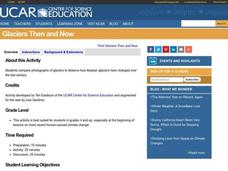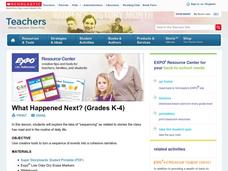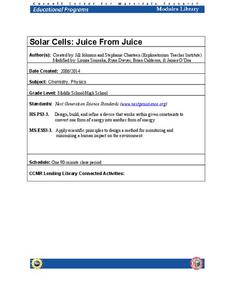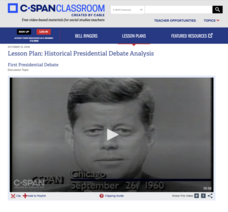Curated OER
"Old 300"
Fourth graders combine art and history to assess the importance of the "Old 300." They explore a group of colonists that Stephen F. Austin brought to Texas as the first settlers and then create a time line of major events leading to the...
Curated OER
Multiplication
Young scholars practice their multiplication facts by reinforcement and repetition. Students write facts in their math journals, and use labeled soccer ball and deck of cards to practice multiplying by "number of the day." Play continues...
Curated OER
Alkane Nomenclature Worksheet
This activity asks learners to work on alkane nomenclature. They name 2 straight-chain alkanes and answer 4 questions about branched-chain alkanes. In addition, class members name 5 branched-chain alkanes and draw the structures for 3...
Lesson This!
Fraction Fruit
Discover the concept of fractions by using fruit as a model. Scholars discover fractions are part of a whole, similar to the pieces of fruit which are placed in front of them. They then cut up several different types of fruit and discuss...
Curated OER
Fairy Tale Math
Have class members rewrite a favorite fairy tale in order to incorporate numerical information. For inspiration, the teacher provides an example written by another second grader. These modified stories are then used to write word...
Curated OER
ReQuest Strategy: Reciprocal Questioning
Explore reciprocal questioning with this ReQuest comprehension strategy. After reading a passage, learners first question the teacher, trying to "stump" her. Then it is the teacher's turn to ask the pupils questions. All correct answers...
Curated OER
Patti Smith: Dream of Life
How do artists affect and how are artists affected by the time periods in which they live? Learners examine the life and work of controversial and influential cultural artist Patti Smith as they seek answers to this essential question....
Center Science Education
Glaciers: Then and Now
Cooperative groups compare pairs of photos of Alaskan glaciers. They match a historical photo to the recent photo of the same glacier. The class discusses what conditions are necessary for glaciers to retreat. This abbreviated activity...
Baylor College
The Variety and Roles of Microbes
Mini microbiologists play a card game in which they group microorganisms by groups: virus, fungus, protist, or bacteria. Then they identify the roles different microbes play in the natural world and explore how humans effectively use...
Scholastic
What Happened Next? (Grades K-4)
Explore the structure of narrative writing with this fun, collaborative lesson. Start by reading aloud a short story, asking small groups of learners to fill in key events on a large story board prepared on the class whiteboard....
Berkshire Museum
Adopt a Schoolyard Tree
Help young scientists connect with nature and learn about trees with a fun life science lesson. Heading out into the school yard, children choose a tree to adopt, taking measurements, writing descriptions, and drawing sketches of it in...
Pinecrest Preparatory Middle and High School
Short Story Planning Guide
A short story is only as strong as its characters, development, and conflicts. Encourage the young authors in your class to plan their stories based on the elements of narrative writing, all provided in brainstorming graphic organizers.
Virginia Department of Education
Inductive and Deductive Reasoning
Introduce pupils to the two types of reasoning, inductive and deductive. Classmates work in pairs or small groups to learn the difference between the two and apply these reasonings to develop valid conclusions.
Cornell University
Solar Cells: Juice From Juice
Unleash the power of ... blackberries! Science superstars create solar cells using the juice of berries or leaves of a citrus tree in an engaging lab. In addition to offering a plethora of resources, the teacher's guide gives background...
Social Media Toolbox
A Look at Social Media Policies
Should school news publications use social media if their district is against the use of social media in school? Pupils ponder the policy, then examine their publication's plan in parts seven and eight of a 16-part Social Media Toolbox...
Curated OER
Learning Through Autobiographical Situations
A special education classroom examines a variety of literature from Latin American authors. In groups, they read excerpts from many autobiographies and compare them with their own life. After writing their own autobiographies, they...
Curated OER
Math Throughout the Day
Learners practice their number sense throughout the day. They practice their use and understanding of numbers in every part of the day. Learners watch and listen to the teacher count students in class, sort themselves based on colors or...
BioEd Online
Arm Model
Arm your young scientists with knowledge about anatomy as they build their own model of the elbow joint. Help them get a firm grasp on how muscles and bones interact to allow movement as they try different positions for the muscles on...
University of Kentucky
The Great Spider Debate
Poor, misunderstood spiders! They are feared, disrespected, and detested by many people, yet they do so many positive things. A great addition to any insect unit, learn about some of the more common spiders, while hopefully dispelling...
Diablo Valley College
The Language of Sets and Set Notation
The basics of number theory and set notation are explained in a highly approachable way in a self-contained lesson and worksheet. Introducing the vocabulary and concepts from ground zero and building to more complex ideas of subsets...
C-SPAN
Presidential Debate Analysis
The modern presidency is defined by the development of television—including the use of televised debates in the campaign. Using debates going back to the first one between John F. Kennedy and Richard Nixon, young scholars evaluate...
BBC
EU, UN, and Commonwealth
Find out how international government organizations work to face global issues. Learners examine if major organizations like the EU, UN, and Commonwealth are effective at tackling big issues like animal protection. They think about...
Royal BC Museum
Kids Page - Whales
Read about the physical features of whales and how they are grouped according to their method of eating food. A neat activity is described on the page; consider carrying this out in class. The resource makes a nice addition to a lesson...
Curated OER
Sharing Treats
Most kids love treats, but they have a hard time sharing them! Reinforce both the value of sharing and the skill of division. Third graders divide up various snacks between kids, puppies, and bunnies. Tons of fun to solve and color, this...

























